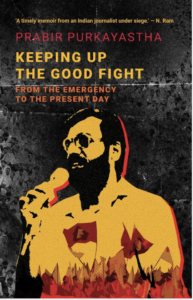The apology filed by journalist Dhaval Patel that resulted in an order from the Gujarat High Court to quash a sedition charge against him only underlines the need to repeal an unjust, unfair and redundant law.
Patel, the Ahmedabad-based editor of a news web portal called ‘Face Of Nation’, told Free Speech Collective that he had no option but to tender an unconditional apology. “I cried the day I submitted the apology. But I could not continue. No case of sedition has been made out against me. No guilt has been accepted,” he said.
Sedition, a colonial-era law, has been increasingly used for all manner of dissent. Sec 124-A of the Indian Penal Code carries a punishment of upto life imprisonment against anyone who, by words, spoken or written, or signs, or visual representation, attempt to bring into ‘hatred or contempt, or excites or attempts to excite disaffection towards the Government established by law in India journalists, lawyers, student activists, tribals, cartoonists, a school teacher and the parent of a student, political protestors, Jat agitationists, etc.
On Nov 6, an order by Justice R P Dholaria of the Gujarat High Court said:
“The impugned FIR/proceedings are quashed and set aside with a caution to the petitioner that as and when he may publish any article in future, no such comments be used against any constitutional functionaries without verification and he shall be cautious of not repeating the same.”
Patel’s apology read:
I tender my unconditional apology for the allegedly offending article published by me in my web portal face of the Nation basis which the impugned FIR has been registered against me. My unconditional apology is without prejudice and
without admission of any guilt.”
Patel had filed a report on May 7 entitled ‘ગુજરાતના મુખ્યમંત્રી બદલવાની શકયતા અંગે અહેવાલ રજૂ કરવામાં આવ્યો હતો (Mansukh Mandaviya called by high command, chances of leadership change in Gujarat)’, that the BJP was planned to replace Gujarat chief minister Vijay Rupani with Union minister Mansukh Mandaviya since the former had allegedly mishandled the Covid-19 pandemic in the state. On May 8, a complaint was filed by an officer of the state crime branch, charging him with sedition under section 124-A of the Indian Penal Code and under Sec 54 of the Disaster Management Act.
Patel was arrested on May 11 and spent nearly 15 days in custody. Initially, giving an order sending him to police custody, the Additional Chief Metropolitan Magistrate M J Khojjada, said his report was ‘fake news’ and said the editor was trying to destabilise an elected government. Dhaval managed to secure bail only on May 27 after an additional sessions judge Prerana C Chauhan said that prima facie, no serious offence was made out against him.
In 1960, the charge of sedition was read down by the Supreme Court of India in the Kedarnath judgement. Probably the first case of sedition decided on the basis of an apology, the case can definitely set a precedent. In any case, Patel’s report which merely referred to internal politicking within the ruling BJP would have been well covered by the provision in the law that ‘comments expressing disapprobation of the measures of the Government with a view to obtain their alteration by lawful means, without exciting or attempting to excite hatred, contempt or disaffection, do not constitute an offence under this section.’
Initially, Patel said he was ready to fight the case. “When the police came to arrest me, I did not resist like other editors. I know I did not do anything wrong or had written anything false. But slowly, I realised that I just cannot fight. The case may take three-four years. Till then, I cannot write freely and my every report will be scrutinised. I am losing revenue and cannot afford the long battle,” he said. Patel, who does acknowledge the support he got from journalists across the country, said he still felt very isolated.
Patel’s lawyer Anand Yagnik told this writer that he was equally disturbed at the apology. “Patel decided to tender an apology. I think he had faced a lot of harassment and could not hold out. He wanted to put an end to the matter. I had to go by what my client wanted,” he said.
Yagnik said that he had successfully managed to get bail for Patel. The case came up before at least five judges and four of them were not interested in conducting the matter, perhaps because it was seen as a case against the government. But finally, Patel felt alone and did not want to fight the case.
Journalists who supported Patel said that the procedures took their toll on him. Police investigations into the case included his friends and family members, his portal and its source of funds. The case came up for hearing every 15 days and for Patel, who was not associated with any major media house or had any steady source of income, the going became more and more difficult.
The 32-year-old journalist has worked in several media houses, including ANI, Sandesh and Divya Bhaskar. His weekly newspaper ‘Face Of Nation’ was launched in 2010 but was stopped during the Covid-19 pandemic. The website continued to publish news reports and covered the pandemic extensively. His colleagues said he was known to be a combative journalist and he has broken and reported several important stories in his portal, including against corruption in an Anganwadi scheme, the Nadiad municipal authorities and other reports.
Patel says that he will continue to write. “I’m not one to back out. I wanted to fight, not just for myself but also for others, but at present, I just cannot. Someday, I will write,” he says.




